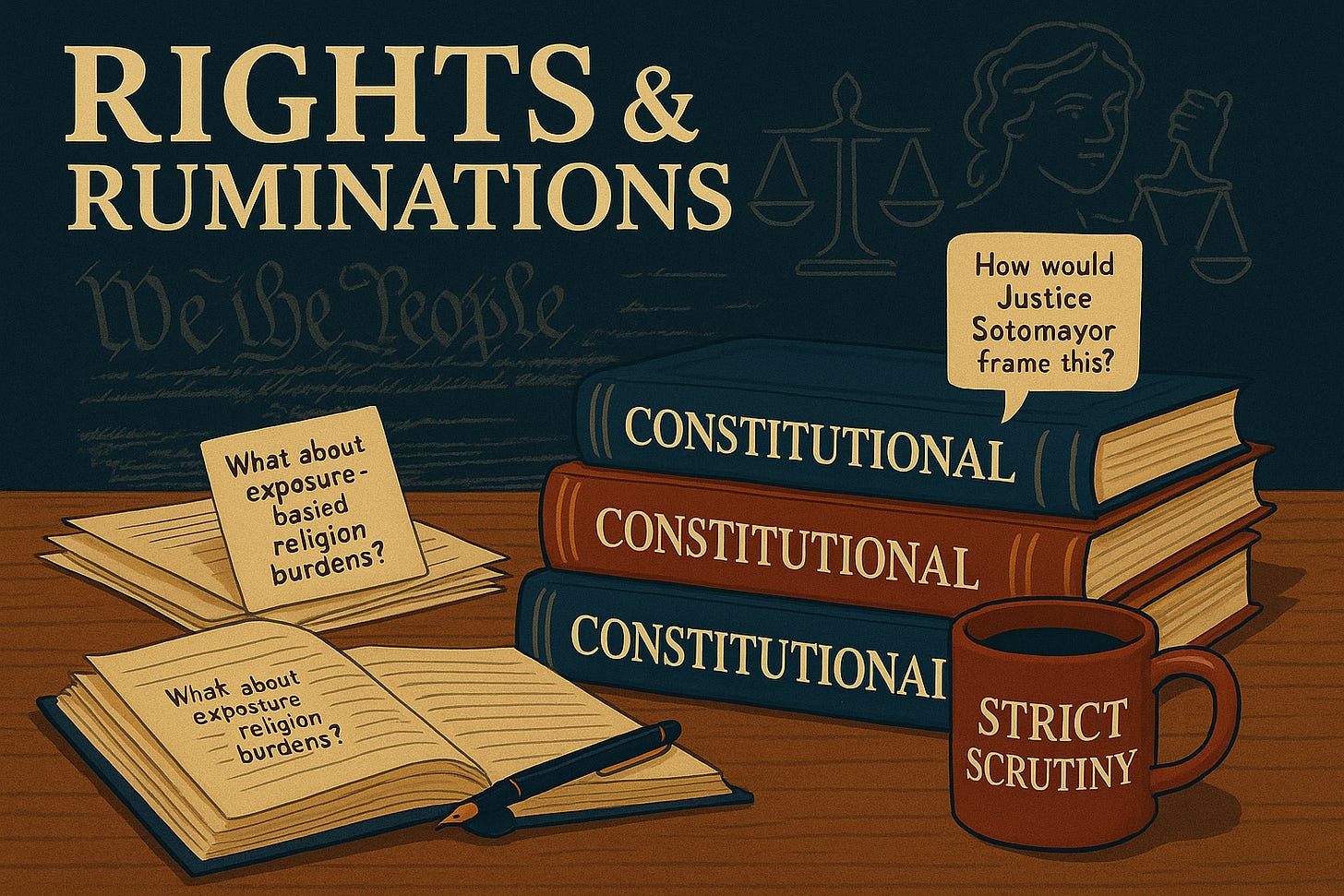Welcome to Rights & Ruminations
Or: How I learned to stop worrying and love the Equal Protection Clause
Hello, fellow travelers in the strange and wonderful world of constitutional law!
I’m starting this Substack because, frankly, I needed a place to put all the random thoughts that pop into my head at 2 AM while reading yet another Supreme Court opinion about whether a tomato is a fruit (spoiler: legally, it’s not). Teaching constitutional law means living in a constant state of intellectual curiosity mixed with caffeinated panic, and I figure—why should I suffer alone?
What Is This Place?
Think of this as my public prep notebook, where I’ll share the messy, non-linear process of preparing to teach the grand experiment that is American constitutional law. You know how people say “never watch sausage being made”? Well, this is exactly that—but for constitutional law classes.
I’ll be ruminating on all the big areas we cover:
Economic rights (where theory meets the messy reality of markets)
Privacy (from Griswold to the digital age)
Substantive due process (liberty, defined and redefined)
Equal protection (the eternal promise of the Fourteenth Amendment)
Free speech (balancing marketplace of ideas with real-world harm)
Religious liberty (where accommodation meets neutrality)
Who’s This For?
Fellow professors: You get it. The existential crisis of making centuries of legal doctrine make sense in today’s world, when constitutional principles written in one era must speak to challenges the framers never imagined.
Students: Consider this your behind-the-scenes peek at how we actually prepare for class. It’s not just about memorizing cases—it’s about understanding how these legal principles shape our world.
Curious humans: Constitutional law affects everyone. These aren’t just abstract legal principles—they’re the invisible architecture of how we live together.
The Art of Constitutional Rumination
There’s something deliciously absurd about constitutional law. We’re constantly asking questions like: “What did James Madison think about Instagram?” and “How would the Founding Fathers feel about airplane Wi-Fi?” It’s time travel meets legal reasoning, with a hefty dose of “well, it depends” thrown in.
But this isn’t just academic navel-gazing anymore. With headlines daily about constitutional crises, debates over fundamental rights, and questions about the very foundations of our democratic institutions, constitutional law feels less like ancient history and more like urgent current events. These classroom concepts are playing out in real time, making our ruminations more vital than ever.
I’ll share my own podcast episodes that dive deeper into the topics we’re covering in class, the articles that make me pace around my office muttering “but what about Griswold?”, and the moments when centuries-old text suddenly becomes crystal clear in the context of today’s world.
What to Expect
These posts will be part diary, part teaching prep, part love letter to the beautiful mess that is constitutional interpretation. I’ll share:
Weekly reading reflections (the good, the bad, and the “did they really cite that case?”)
My podcast episodes that explore course content in greater depth
Connections between current constitutional debates and classroom doctrine
Those “aha!” moments when complex doctrines suddenly click
The occasional existential crisis about whether we’re teaching law or philosophy in robes
How today’s constitutional controversies illuminate timeless questions about rights and governance
Fair warning: I might get excited about things like the evolution of privacy jurisprudence or the intricacies of equal protection analysis. I promise to try to make it interesting.
A Humble Invitation
So join me in this journey through the intellectual rabbit holes of constitutional law. Whether you’re a fellow professor looking for solidarity, a student trying to understand why we care so much about 200-year-old documents, or just someone curious about how this whole constitutional thing works—welcome.
We’ll ruminate together on how these dusty cases and ancient amendments shape our daily lives in ways both profound and wonderfully weird. When the morning news talks about constitutional crises, we’ll have the tools to understand what’s really at stake. After all, constitutional law is really just humanity’s ongoing experiment in organized chaos, and if we can’t find some wonder in how it’s unfolding right now, we’re missing the point.
Let’s dive in, shall we?
P.S. Yes, I will absolutely geek out about footnote citations. You’ve been warned.


